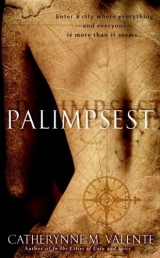
Текст книги "Palimpsest"
Автор книги: Catherynne M. Valente
Жанр:
Классическое фэнтези
сообщить о нарушении
Текущая страница: 7 (всего у книги 19 страниц)
November pulled herself into a gray corner and clutched her notebook. She found the man in the willow-green shirt’s apartment unutterably lonely: only the corner she pressed up into spoke to her of living souls. She wriggled into the empty space there, a pale square in the dust-shabby paint: the ghost of a previous tenant, the restless shade of a vanished bookshelf. She huddled into its borders, knees drawn up against her nakedness. She pressed her cheek against the cold wall, her blackened, burning cheek. A tear slipped between her face and the plaster.
The young man slept still. The willow-green shirt slept, too, forgotten in the small kitchen. His books were propped up on cement blocks; there was a thin lithoid television, a pair of brown shoes. November drew further into the corner. She missed the bees, her own bees and the dream-bees. She worried for her hives like a mother—spending the night in the city is reckless behavior for the mistress of so many.
“I’m not going to hurt you,” he said, muffled in powder-colored sheets. “You could have stayed in bed. It’s warmer.”
“I’m not good at that.”
He emerged from linen, a blur of haphazard black hair and sleep-flattened cheeks. He groped for his glasses. “You’re not good at staying in bed?”
“At any of it. At other people. At mornings.” She closed her lips against the forming list. They were for her notebooks, not for speaking, not for saying. Air could ruin them, take them apart, make them meaningless. They were fragile, like honeybees. Like cobwebs. November sniffed and wiped at her face. Men were difficult, she had always found them so. Hoary old birds on the bough, staring with sharp mouths. They chewed and chewed at you until there was nothing of interest left.
He watched her, propped on one elbow; he had watched her even when he had pulled her onto him, watched her in the calculating way of owls watching a hinge-jawed vole– will she run?
Will she scream? What will she taste like? How many others like her are hidden in the grass?
“You’re so new,” he had breathed into her collarbone, his thumbs under her breasts, fingers splayed out against her back. “So new.”
She had watched him, too. Distantly, from a great height, from far off. She had moved mechanically, keeping her mouth bitten shut. She hadn’t come; she hadn’t wanted to. She hadn’t wanted him particularly, he had no blue eyes, no lineages in his heart, prophet to caliph to teacher’s assistant. He had not even told her his name, so eager was he to touch her face, to trace the streets there. So eager to return to this gray smear of a house, to the mattress on the floor, lonely of box spring or frame. And his long, tapered finger, so wound with blackness, sliding in and out of her, as though the whole city could fuck her, just like that.
He had told her about that place, told her its name, told her how to get there, pulled her close with the promise of a city she remembered in small bursts, like novae, a dream that was not a dream.
That was enough, she would suffer his body in hers for that. And she believed him, she believed because of Xiaohui, who had told her nothing but wedged her open, and all these others, now, all these others could enter where Xiaohui had forgotten to close her when she went.
“Living alone,” November whispered, “is a skill, like running long distance or programming old computers. You have to know parameters, protocols. You have to learn them so well that they become like a language: to have music always so that the silence doesn’t overwhelm you, to perform your work exquisitely well so that your time is filled. You have to allow yourself to open up until you are the exact size of the place you live, no more, or else you get restless. No less, or else you drown. There are rules; there are ways of being and not being. This sort of thing,” she gestured imprecisely at the room, the bed, him, “is forbidden. It expands or contracts me, I’m not sure which, beyond the . . . set limits. I’m not good at that, either. Expanding, contracting.”
Her companion uttered a small noise between a sharp sigh and a soft laugh.
“You don’t have to be, you know,” he said with a sliding sadness. “This has been going on for some time. There are patterns to us now.” He moved his hand on the sheets as if to reach out to her. “Rules. Protocols. You don’t even have to talk to me, if you don’t want to. People worked this out a long time ago. It used to be awkward, when you wanted the entranceand not the person. The invitation, not the plus-one. It varies a little from place to place—it’s pretty formal here, like a transaction. If,” he looked down at his fingernails, “if you’d wanted me for myself, you would have turned the stone on that ring you wear on your middle left finger inward. If you wanted it to be more than once, you would have turned your pinky ring in. There are codes like that. If you wanted a feast, elaborate sex, if you wanted to make a ritual of it, you would have worn green shoes. I didn’t expect you to be here in the morning, with no ribbons in your hair and all your rings turned out. And two buttons, not three, undone on your dress. That means strictly business, altogether. But you’re new, so I guess I should have figured you didn’t know the ropes.”
“How long have you had it? Has your finger been like that? Have you been . . .”
He drank from a glass of water left on a makeshift nightstand—a pile of thick hardbacks. “Traveling? Passing over? Expatriating? About five years, I think. It’s hard to pinpoint, because hardly anyone remembers the first night. One dream is just a dream, you don’t give it a thought. It’s only the second one that sticks, and if you’re lucky, your second lover has been at it long enough to have figured out a thing or two.”
November swallowed. “How many of . . . us. . . are there?”
He looked at her very seriously, tilting his gaze over his glasses. “Not as many as you’d think. But enough. We’re secretive about it, you know? It’s precious, like a pearl at the bottom of the sea. There are no magazine ads, no decadent clubs, in this country anyway, no websites. We keep it contained. If a site goes up, the rest of us take it down, one way or another. You gotta be strictly low-tech. Analog. Fly low—an old-fashioned underground, get it? Sometimes I think I spend half my time crawling the web for . . . well, we call them errata. Hasn’t been one that’s stayed up longer than twenty-four hours in years. It’s . . . hard. Holy work is always hard. We keep to ourselves on this side, to protect it. Sacred places, you owe them something. We owe it. You wouldn’t want just anybody—”
“So only the rightpeople get to go? People who are rich enough or pretty enough?” November said bitterly.
The young man clenched his jaw and released it slowly.
“Sweetheart, imagine someone who’s a big man over here. The head of a corporation, or, hell, the president of a country. Imagine that in the sorts of places those men go to cheat on their perfect little wives, one of them picks up a little virus—hey, it doesn’t hurt his health, really, and he can cover up the black mark for press meetings. But imagine that he’s smart enough to figure out what’s happening to him when he goes to sleep, which, given his Ivy League pedigree, he probably is. Imagine what happens when a man like that finds a city of impossible, untapped wealth, a nearly limitless labor force, power that isn’t magic, not really, but close enough that he could dazzle the world, become a wizard-king with his amazing machines.” The young man crossed his arms.
“Now you tell me how long you think it would be before troops started forming lines at brothels. How long before there are boots in every street in Palimpsest? Sacred places, November. You owethem something. You stand between them and the rest of the world, or else the world gets its ugly, stupid way.”
November reeled back, chastened. She could not bear the thought of a man like that in Orlande’s shop, his feet filthy with ink. She did not want to know it could happen.
“But Xiaohui—”
He barked laughter like a sea lion. “Xiaohui? Oh, god. You poor kid.” He got up and padded over to her, sitting against the wall without noticing the absent bookshelf, his naked limbs tossed casually about like toys.
“Xiaohui’s . . . sort of an evangelist. There’s a few of us like her. We try to keep them contained, too. They don’t get invited to parties, generally. She’s a big girl, bigger on the inside than on the outside, you know, and she can’t bear the thought of being alone in that place. She takes anyone she finds, even blanks like you. It’s . . . well, some people would call it immoral. She never cared. I spent my junior year chasing her errata through these obscure little knitting magazines.”
“Have you and she . . . ?”
The young man blinked. “She’s my sister. You knew that, didn’t you? I mean, it’s our mother’s shop, there’s hardly anyone but you who eats there without blood ties.”
November chewed her lip vigorously, as though she meant to devour herself voice-first. She glanced up at him gravely, for there were not so very many blithe expressions granted to her grim and earnest face.
“But have you?”
He seemed to grow sudden wrinkles, his eyes creased with old worries. He exhaled a long-held breath and picked at a toenail intently. “She never cared about any of that, not immigrant morality, not anyone’s. The city was everything to her. The rest—just bodies. One body, two. Mine, hers. She showed me her leg—god, it was so long ago! She took me into the storeroom and the cookie dough was flattened out into all these long, gold runners on the counters, and piles of blank fortunes, so many, like confetti. She pulled up her dress and I laughed at her, but it shut me right up, that mark on her, like some ghost had punched her as hard as he could. And she kissed me so hard, her little teeth, she kissed me so hard and bit at me and I bled in her mouth, and she just didn’t care. She never did. It was only once, only ever once with her. An experiment, I think. To see if she could go that far. She pushed me onto the fortunes and I came so fast and hard it blinded me for a minute, like a flashbulb bursting. I could say I gave in, that it was all her, but that would be a bigger lie than I can fit my mouth around.” He sniffed sharply, waiting for her disapproval, hurrying to head it off. “You do things, when you’ve been there, you do things you could never even have thought up before. I mean, it’s not exactly safe, is it, what we do? You could end up churned up inside with disease, pregnant a dozen times over, dead. But it doesn’t matter. We’d take all that and more besides if it means getting there. Incest hardly ranks.”
November considered him coldly, and the creases of his eye seemed to speak of debauch and torment, but more of love and longing and blind stumbling in the dark. She doubted he had ever worn his rings turned outward in his life. She doubted he had thought of anything when he had cried out like a falling sparrow within her but Xiaohui. Certainly she had not.
He cupped his hand against her cheek. “I’m sorry it was your face. That’s . . . unlucky. No one gets to choose.”
Things that cannot long be kept secret: death in the family, the loss of a ring, corruption of the spirit, boredom, illicit love. Sickness. Addiction. Pregnancy.
Within the pure white wimple of her beekeeping suit, wrapped in buzzing, worried voices panicked that their mistress had strayed from them, November told herself that Xiaohui’s brother was the last, that she would stop this here. She would stay in her home; she would travel for cacti twice a year; she would send her crates of honey through the hands of others. Plenty of takers, plenty of drivers. The bees did not care whether she was disfigured. She would be a nun of the hive, a soul in the sisterhood of summer.
It would be all right—she had touched a secret thing, but a touch was enough. She had no brothers with which to debase herself, but she did not need or want them. She would not move down the path. If it meant so many strange lovers, if it meant allowing so many people into the small space of her, she could give up Palimpsest. She would refuse it. It was easy; it would be easy. She had enough here—had that not been the purpose of this house, these hives, this place so near to her moss-blanketed father? To have enough, to grow precisely large enough for this place and no larger? The gigantism that the city and those telescoping lovers promised with such vigor was no friend to her.
But this did not save her from her dreams. No nun has ever been saved by virtue from ecstatic visions of demons and angels breaking the stalks of one another’s wings. She called out to the brassy city in her sleep, she touched the Memorial, the ostrich-orphan in the center of the road. She felt within her those three strange folk who moved and ate and sang so far away from her. She felt the bees on her breast. She stood thirty nights in the shop of Aloysius, who shook his white-wigged head at her in such disappointment it pierced her true as his needles. Once he had even wept at her feet, his face pressed to her stomach.
Why? Why will you not do as the rest have done? Why do you haunt me like this? Is it because of what I said? Because I was rude? I apologize. A hundred times I apologize. When will you yield to us, you awful girl, you who saw me so clearly and purely that my heart broke in your hands?
Yet when she tried to run from his pleading or his admonitions, when she tried to flee with her lavender-suited homunculus, when she tried to go, not to the shop of Aloysius at all, but down the long planks of another street entirely, she was turned back. Walls of amber shadow coalesced in her path, or barricades of impassably tangled streetlamps like briars sprang up, or else the street simply vanished into a void she could not cross. The world of her allowable presence was limited to two avenues and no more. Her city was constant, faithful, every night her own, but she could not pass beyond the places she had touched that first night she dreamt against the shorn neck of Xiaohui’s brother.
In the mornings, she woke weeping. She would snatch her notebooks and cover them with furious scrawls: Things I Will Not Do, Things Beyond My Abilities, Women I Am Not, Places I Will Not Go, Things Which Are Not Real, Things Which Will Surely Destroy Me.
She flung the notebooks against the wall. They left marks in the perfect whiteness, and she listed those too. She shut her eyes against her own self, her own need for that place as though it were a person she had not seen in years and missed terribly.
_______
“Everything has its place,” her father had once said to her when she was young, showing her the long cedar drawers of a card catalogue in the great library where he worked, the brass brackets on its face shining like a policeman’s buttons. “But more important, everything’s place is labeled. Order is transitive: order one precious thing and order the universe.”
“Do I have a place in there?” November had asked, peeking over the rim of the long boxes.
“Of course, baby,” he had said, and with his big brown hand, cuffed in plaid and smelling of lemon rinds from her mother’s morning tea, riffled through a drawer and pulled a card from the stack:
006.332. The Girl Who Circumnavigated Fairyland in a Ship of Her Own Making.H. F. Weckweet, 1923. Gleiss & Schafandre: New York.
She had taken it seriously. Even then she had not known another method of doing things. The book was on the seventh floor and she had walked the steps, every one, knowing that this was the only proper way to proceed to her place in the universe—an elevator is cheating. The book was small, in a brown leather cover embossed faintly with a little girl standing naked on a raft, straight as a mast, her stance determined, holding up her dress as a sail. It was, at the time, the oldest thing she had ever seen.
November had read it exactly two hundred and seventeen times, not counting unfinished perusals, since that day. It was, in fact, a long series of novels for children, but November did not care for the others: her father had not pulled them from the great catalogue and called them hers. She had not climbed seven flights of stairs for them. She had spent her birthday this year, her thirty-first, reading it cover to cover, dawn to dawn. The girl in the book was named September, and she had known that this was meant for her, a message from Hortense Francis Weckweet and her father. Perhaps if the girl had not been called September, November would not have read it two hundred and seventeen times.
Behind her eyelids the image of her father with his hands full of catalogue cards like a poker player warred with the image of Aloysius weeping, begging her: Leave me alone, I cannot bear it, I cannot bear you.
November sunk her head in her hands. I cannot bear it, either, but the alternative is too big for me. I have nothing. I am not a brave girl.
The bay fog slid over the hills like tea steeping. I am not brave,she thought, but I do have a dress. I have that. A dress like a sail.
She dried her eyes and pulled a cough of orange silk from her closet. She brushed back her hair into a librarian’s bun so that no one would miss her face. Alleyways burned triumphant on her cheek. She turned all her rings firmly outward. They glittered like a knight’s glove.
_______
It took nine nights in the city. She drank foully sweet things and waited. Hard-angled, fashionable people stared nakedly at her. Her skin flared hot with shame and determination. I will stand upon my raft until the Green Wind comes for me, she thought, quoting Weckweet, quoting the book of her childhood. My dress; my sail.
And the Green Wind did come, slowly, gently, though in no chrome-walled bar or library annex. November was tired, heading home, walking through the thronging battalion of pigeons in Union Square, back to her car, back to the bridge and the bees and home, to Hortense Weckweet and a thousand unfinished lists.
The woman looked like she must have come from the North Pole: frizzy pale red hair blossoming around broad red cheeks whipped flush by the cold, a great long scarf trailing behind her. She wasn’t pretty, but she wasn’t plain. She didn’t say anything, but her face was so bright and hopeful, so welcoming that November’s ribs ached. The woman ran to her and stopped up short, her breath fogging in the evening air, the cutting blue breezes that belong to the Bay at dusk. She unbuttoned her peacoat with shivering gloveless fingers and pulled up her sweater like a child. It was on her belly, just under her left breast, like a patient spider crouching on her skin. The girl glanced at November’s rings and grasped her face in delicate fingers, kissing her with the ferocity of a newborn bear suckling at its mother.
Krasnozlataya and Corundum
A HOUSE SITS SQUARELY ON THE CORNERof Krasnozlataya and Corundum Streets. Over the years it has grown to encompass nearly the whole of both boulevards, up to 19th Street and down to 6th. Through the spaces where its cornerstones do not mark the earth, the gardens of this house spill out onto the street in long emerald swathes. Beggars sleep beneath the pomegranate trees, and the carriage tracks swerve gracefully to avoid the intruding verdancy.
The house itself was planted as a sapling, its roots bound up in muslin and soaked in rose water. Three women brought it in a pine bucket, stroking its bark to keep it calm. They buried it in secret, hidden by a complicit moon, in the soft earth that was then Krasnozlataya Street, before the underground trains and the elevated tracks, before the great spires, before water-spouting, mice-headed gargoyles bred on that broad road with such zeal. The women wore gray veils and crowns of steel gears. They knew how to conduct rites properly—how to dress, how to stand. They came each night thereafter to feed it and whisper to it, they came silently and with sweet things in their pockets: sugar and apples and Spanish tiles and slivers of False Crosses, braids from their own head, ivory buttons, golden sewing needles and the heels of a thousand Sunday roasts, cherries with pits of hard molasses, faucet heads in the shape of men’s mouths, frankincense and myrrh, lye and whiskey, long black pokers and swaddling clothes, handbags and haircombs, Christmas cakes, hemlock, lemon tea and glass goblets, a slaughtered blue sheep, and, lastly but most important, the sad gray form of one of their sons, who had strangled in his umbilical cord.
Whose child it was none of us may tell.
All of the women were named Casimira. They did not find it confusing.
The house, well-fed beyond all dreams of cornice and window hinge, began to grow so quickly and with such vigor that the houses on either side of it were forced to pick up their prodigious suitcases and, with much pointed sniffing, homestead elsewhere. The house threw up radiant cedar walls and windows of smoky glass. Bronze roof tiles clattered out from the chimneys like dominoes falling. Palisades and sweeping stairs twisted up from the earth, and long hallways stretched their arms for children to hide in. It opened room after room like blossoms, each furnished in a single color, for it was an orderly house and liked things just so. It sent up eight floors to begin with, and more sprouted with the harvest each year. It peaked and gabled its tiled roof, and threw towers into the air. At night passersby heard the house singing little nonsense songs to itself as it dressed up, a girl waiting with breathless hope for a festival to begin.
Finally, the house opened a room in its topmost tower, the largest of all the rooms it had ever grown before, and this room it colored in every shade of scarlet so that to stand within it was to stand within a beating, bleeding heart. This done, the house locked itself and waited, growing only as a tree will grow, one ring for each year.
It became the habit of the Casimiras in subsequent years to bring each heiress to the door of the wonderful house and press her little hand against the knocker, a lovely thing in the shape of a lion’s paw. For many years, the house remained quiet and inert, no matter the charms of the young visitors. When the current Casimira turned eight years old, she was brought to the house. Her mother took her steady hand in hers and lay it against the door.
Perhaps you have already guessed it, for you are no doubt very clever. I certainly knew it must happen this way, but then, anticipation is one of my great hobbies.
_______
The lion-knocker sounded clear and long, and the door opened without the smallest creak. It closed sharply behind the child, however, and kept her parents in the snow.
Little Casimira stood in the great hallway, at the foot of a staircase like a tier on the wedding cake of a giant. After a long while, she fell asleep on a plush lavender chair for lack of anything better to do.
When night came spooling blackly through the tall windows, a little boy came tiptoeing down the stairs and held Casimira’s hand. He had a thick blue ribbon around his neck, like a girl’s necklace, but wider, and it was very tight, but the boy was lovely all the same, with a high flush on his pale cheeks and extremely proper slippers on his small feet. He shook her awake, but very gently, with solicitude.
“Wake up, Casimira,” the boy said. “Wake up.” The boy smiled at her very perfectly, an expression of pristine technical accuracy, as though he had practiced the smile in a round mirror for eight years. “I do not have a name,” the boy demurred, “so I cannot introduce myself to you, but I would have been your grandfather, if I had not been so clumsy and tripped over my mother when I meant to come into the world.”
Casimira did not answer.
“I have kept a room for you,” the house said, and blushed perhaps more deeply than it is correct for boys to blush.
_______
The sky is needled with stars, and November breathes in the green cardamom and laurel of the Palimpsest winds. She wears the violently blue dress of Aloysius, and her belly prickles in the breeze. Peacock feathers graze her shoulder. The buildings of Krasnozlataya Street spindle tall and thin around her, so tall that long scarves of clouds obscure their peaks, and she wants to shiver, but she cannot manage it. From every terrace and corner grin gargoyles through which old rainwater spurts in sprays and splashes, only to be caught in long pools at the base of each tower. The little faces are mice and hedgehogs and opossums, foxes and rats and blind, nosing moles. Their faces contort as all gargoyles do, peering from within curling stone leaves, licking sharp teeth, but their faces seem so sweet and dear to her, she laughs in the middle of the street, and they grin wider on their heights.
Yes, she thinks, it is all right. I am here. I am here and it was worth the price. It was worth a stranger with red hair, worth a boy who loves his sister, and his sister, too. Worth all of them.
But the bees are impatient with her gladness. They pull her to a door so great she does not right away realize that it is attached to a single house. An enormous lion’s paw marks its center, and she puts her hand upon it, as if greeting tenderly the beast whose foot it must be. The bees scream, and the screams of bees are joy or rage; there is room in them for only two kinds of cries. The lavender-suited manikin circles her waist with its buzzing arms; the door opens with a grand sweep, as though it had practiced just such a sweep for a decade and more.
Framed by thick ferns and far too many umbrella-stands, a woman stands just inside in the hall. She wears a severe dress, just the sort of thing a governess might wear, green-black from throat to floor, clasped by an enormous copper wasp at her collarbone and a long, ornate belt, copper too, a shining chain of tiny boxes that circle her compressed waist and trail to the floor in line like a monk’s knotted rope. Her curly hair is piled high, an artful, decorous shade of green, deeper than emeralds or water, a sedate and proper color. It is the exact shade of her eyes. She holds a child by the hand, a boy with a blue ribbon around his neck, dressed like a little dauphin, and he hides behind the woman’s voluminous skirts, peeking out at the newcomer.
The bee-manikin strides jubliantly to the woman and tips her chin towards itself. She kisses the bee-crowded face warmly, tilting her head in the classical pose of the seduced woman. The manikin gestures emphatically toward November and promptly dissolves into a swarm which dissipates through the house, leaving Aloysius’s beautiful suit in a ripped, wrinkled pile on the immaculate floor.
“I like your dress,” the woman says coyly. The boy hides his face in her bustle.
“Aloysius made it,” November says, unable to think of anything better, more clever, more deserving of the woman before her. Her throat constricts.
“Oh, I know! I have several of his. There’s no mistaking his work, really.”
The two women are silent for a long while. A far-off clock whispers the hour.
“I also know,” the green-haired woman says finally, “because I bought it for you. It’s a present.” Her blush is so furious that November can feel the heat of it just inside the great door.
“What have I done to deserve such a present?”
“Well.” The woman looks determinedly at the floor. “My bees became very excited some time ago. They danced and sang a name, over and over, and I could not sleep for their chanting of it. The queen asked for an audience, and I let her sit upon my earlobe. She rubbed her legs together and said that they had fallen in love with an immigrant woman. They said she smelled like gorse and hibiscus pollen. They said she knew how to love them back, they were sure of it. And they were sure, as children are always sure, that their mother would also love the object of their apiary affection.”
“Are you their mother, then?”
“I am Casimira, and that is as good as saying: yes.”
“I am glad that I fought so hard against coming back to this place, Casimira, or I might not have found the girl with your house on her belly.”
Casimira’s eyes move appraisingly over November, who feels very much like a child in her lavish clothes.
“The dress will do, I think. Next time I will know better what suits you.”
“Do for what?”
“I am taking you to the opera. How else shall we get to know one another? That is why you needed a dress. I do not care much for fashion, but a dress is like a sail, it must be held before one, colossal and dazzling, if one is to get anywhere at all.”
November’s eyes blur with tears. My dress; my sail.
Casimira crosses the quartz-veined floor, takes November’s slender hands in hers, and leans forward to press cheeks, two absurd Victorian ladies, too proper for kisses. They stand thus for a long while, and only after that while whittles away does the boy timidly, carefully, place his small hand on November’s long blue skirt.
Casimira breaks the embrace and pulls up the length of her belt like a fishwife pulling in her line. She opens the third box from the bottom and withdraws a small ring with a delicate moldovite honeybee in its gem-cage. She slips it onto November’s chapped hand and, hesitantly, holding her breath with an excitement she cannot even begin to contain, turns the stone inward. Casimira blushes again with a heat like a broken furnace.
_______
Casimira allows her smallest fingers to graze November’s as their carriage clatters along the slick bronze tracks. There is no mount—heron-grooms and clip-tail leopards are for those too poor to afford the track tariffs, Casimira explains. But the reins extend stiffly from the jade-trimmed carriage nevertheless, a nod to tradition. The fiery streetlamps blur in November’s vision as they pass away from the great house, past Krasnozlataya Street entirely, avoiding the amber shadows that demarcate November’s allowable space in Palimpsest. They careen down to the bubbling mouth of a thick white river, and the ramshackle houses crowding the banks. The carriage stops at a tottering edifice. Eleven windows are broken; eleven windows are whole. There are no lights within.








